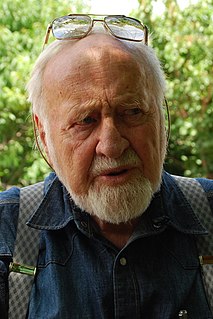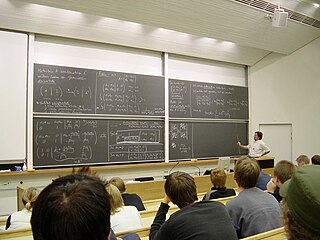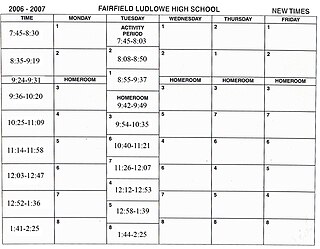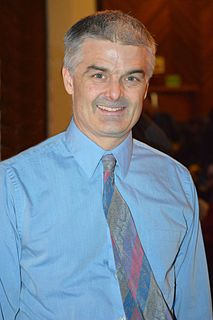
Distance education, also known as distance learning, is the education of students who may not always be physically present at a school, or where the learner and the teacher are separated in both time and distance. Traditionally, this usually involved correspondence courses wherein the student corresponded with the school via mail. Today, it usually involves online education and the learning is usually mediated by some form of technology. A distance learning program can be completely distance learning, or a combination of distance learning and traditional classroom instruction. Other modalities include distance learning with complementary virtual environment or teaching in virtual environment (e-learning).
A teaching method comprises the principles and methods used by teachers to enable student learning. These strategies are determined partly on subject matter to be taught and partly by the nature of the learner. For a particular teaching method to be appropriate and efficient it has take into account the learner, the nature of the subject matter, and the type of learning it is supposed to bring about.

Bruce Charles "Bill" Mollison was an Australian researcher, author, scientist, teacher and biologist. In 1981, he was awarded the Right Livelihood Award "for developing and promoting the theory and practice of permaculture".

In contemporary education, mathematics education is the practice of teaching and learning mathematics, along with the associated scholarly research.

Secondary education in Japan is split into junior high schools, which cover the seventh through ninth grade, and senior high schools, which mostly cover grades ten through twelve.

Wondrium is a series of college-level audio and video courses and documentaries produced and distributed by The Teaching Company, an American company based in Chantilly, Virginia. As of 2015, it had created over 700 courses and sold over 14 million copies.

Bard High School Early College (BHSEC) is an early college school, with multiple campuses in the United States. The school allows students to begin their college studies two years early, graduating with a Bard College Associate in Arts degree in addition to their high school diploma. Students complete their high school studies in the ninth and tenth grade, after which point they begin taking credit-bearing college courses under the same roof. Unlike some dual-enrollment programs, students stay on the same campus for all four years, and both high school- and college-level courses are taught by the same faculty. Teachers at the Bard High School Early Colleges are both certified public school teachers as well as experienced academic scholars, often holding terminal degrees in their areas of study.
The International Baccalaureate Middle Years Programme (MYP) is an educational programme for students between the ages of 11 to 16 around the world as part of the International Baccalaureate (IB) continuum. Middle Year Programme is intended to prepare students for the two-year IB Diploma Programme.

Big History is an academic discipline which examines history from the Big Bang to the present. Big History resists specialization, and searches for universal patterns or trends. It examines long time frames using a multidisciplinary approach based on combining numerous disciplines from science and the humanities, and explores human existence in the context of this bigger picture. It integrates studies of the cosmos, Earth, life, and humanity using empirical evidence to explore cause-and-effect relations, and is taught at universities and primary and secondary schools often using web-based interactive presentations.
David Gilbert Christian, a historian and scholar of Russian history, has become notable for teaching and promoting the emerging discipline of Big History. In 1989 he began teaching the first course on the topic, examining history from the Big Bang to the present using a multidisciplinary approach with the assistance of scholars in diverse specializations from the sciences, social sciences, and humanities. Big History frames human history in terms of cosmic, geological, and biological history. Christian is credited with coining the term Big History and he serves as president of the International Big History Association. Christian's best-selling Teaching Company course entitled Big History caught the attention of philanthropist Bill Gates, who is funding Christian's efforts to develop a program to bring the course to secondary-school students worldwide.

A school timetable is a calendar that coordinates students and teachers within the classrooms and time periods of the school day. Other factors include the class subjects and the type of classrooms available.
Crossroads Christian Academy is a private Christian English-language school in Corozal, Panama. Established in 1997, the school serves students in prekindergarten through 12th grade and is accredited by the Panamanian ministry of education.
Teachinghistory.org, also known as the National History Education Clearinghouse (NHEC), is a website that provides educational resources for the study of U.S. history.

A virtual learning environment (VLE) is a system that creates an environment designed to facilitate teachers' management of educational courses for their students, especially a system using computer hardware and software, which involves distance learning. In North America, a virtual learning environment is often referred to as a "learning management system" (LMS).

Khan Academy is an American non-profit educational organization created in 2008 by Salman Khan. Its goal is creating a set of online tools that help educate students. The organization produces short lessons in the form of videos. Its website also includes supplementary practice exercises and materials for educators. It has produced over 8,000 video lessons teaching a wide spectrum of academic subjects, originally focusing on mathematics and sciences. All resources are available for free to users of the website and application.
Cynthia Stokes Brown was an American educator-historian.

A flipped classroom is an instructional strategy and a type of blended learning, which aims to increase student engagement and learning by having pupils complete readings at home and work on live problem-solving during class time. This pedagogical style moves activities, including those that may have traditionally been considered homework, into the classroom. With a flipped classroom, students watch online lectures, collaborate in online discussions, or carry out research at home, while actively engaging concepts in the classroom, with a mentor's guidance.

Jon (Jonathan) Bergmann is a chemistry teacher and one of the developers of the "flipped classroom" model of teaching along with fellow chemistry teacher Aaron Sams. Although already noted for his teaching, Bergmann decided to "flip" what students did in his classes, watching video lectures at home and doing exercises (homework) in class under supervision. He and Sams not only found that grades went up, they also found time for other types of activities, which Bergmann states is more important than the videos. Bergmann has since become the lead technology facilitator for a school in Illinois, and has worked to promote the models speaking at schools, universities and more both in the United States and abroad. He currently teaches science at a high school in suburban Houston Texas.
Facing History and Ourselves is a global non-profit organization founded in 1976. The organization's mission is to "use lessons of history to challenge teachers and their students to stand up to bigotry and hate." The organization is based in Brookline, Massachusetts, with 180 staff members in the main office and in other U.S. states.

Craig G. Benjamin is an Australian-American historian who is professor of history in the Frederik J. Meijer Honors College at Grand Valley State University, where he teaches East Asian civilization, big history, ancient Central Asian history, and world history historiography. In 2014 and 2015 he served as President of the World History Association.














